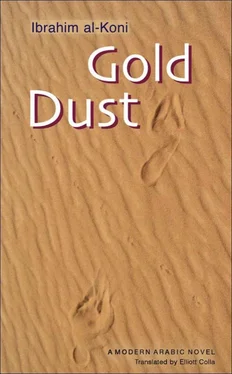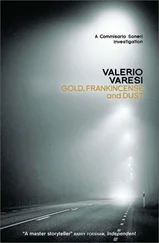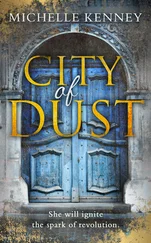He wet his saliva with a sip from his waterskin, then removed the stones from the entrance to his hiding place. The light flooded in and blinded his eyes. Like a lizard, he crawled out of the crevice. The late afternoon sun was brutal. He scrambled down the northern slope of the mountain to study their tracks. He walked in the direction he had heard the whisperings coming from at dawn. Ukhayyad had not gone a hundred feet before he nearly bumped into one of them who was crouched over behind a large rock. As the man looked up, Ukhayyad vanished behind the rocks. Had he been seen? Even if he had not been seen, his shadow or outline surely had. The man suddenly moved, scrambling over the rocks across the slope. So, something had alerted his attention and now he was in hot pursuit. The silence that had followed the murmurings had been part of a coordinated plan!
Ukhayyad crept between the rocks, hiding himself behind stones. He climbed up the slope with hands and feet. Sweat poured from his brow and his heart pounded. Only steps before he reached the entrance to his hiding place, he stumbled into someone or something — a huge moufflon ram, with matted fleece and gnarled horn! The ram was as startled as he and, instead of turning to run, froze suddenly, directly opposite Ukhayyad. He and Ukhayyad stared at one another for a long time. In his eyes, Ukhayyad glimpsed many mysteries. He instantly understood why some men hunt only the moufflon — the animal is no earthly creature, but something divine, more like an angel or emissary. Yes — the moufflon, like the piebald, was a messenger sent from on high. Divine messengers such as these are so very rare!
He heard the roar of rocks tumbling down the slope, and realized his enemy was not far behind. Ukhayyad bolted into his hiding place, leaving the stunned ram still standing there. For the first time ever on Jebel Hasawna, it was a human who fled from the majestic moufflon ram. Ukhayyad secured the entrance with stones, held his breath and listened to the pounding of his heart. He had been prompted to jump to safety, not because of his fear of the steadily gaining enemy, but because of this ghostly encounter with the moufflon. At that moment, he remembered the exhausted moufflon painted on the wall and began to tremble.
The shot rang out. The echo bounced across the mountain for what seemed like an eternity. In places where deep silence reigns, the crash of a gunshot is even more profound. He knew this from having often gone hunting gazelles in nearby valleys during easier years — back before the Italians invaded the country and drove the various tribes into exile.
Had they hit the ram? The men shouted back and forth to one another. A little later, there was some commotion — they had in fact shot him.
One of the men walked up to Ukhayyad’s hiding place and called out to his friends, “This is the ram’s den. These are his tracks. These are his droppings. There are no footprints here. I don’t think you saw a person over there. What you saw was the shadow of the moufflon.”
Ukhayyad wept.
For the second time in his life, he was crying. He could not hold back the tears in his eyes — they poured out on their own. God had sent him a messenger, and these wicked men had killed it.
The messenger had erased all traces of human footprints in front of his refuge. He had also left his droppings. Is this what the animal had wanted to tell him by that inscrutable look? Had he been saying, “I’ve come to rescue you from them — so, save yourself!” My God — why did the innocent always fall at the hands of the most malevolent of creatures? Why do such people kill every messenger that is sent to them?
He listened to the noises outside. Some were busy skinning the animal. Others were collecting the firewood. One of them began to sing at the top of his voice.
In his crypt, Ukhayyad chewed on a few dates, all the while tortured by the aroma of the meat roasting outside. Throughout the night, the smell had risen up to the summit of the mountain and then wafted down through the crevices in the stone. Eventually, it seeped into Ukhayyad’s hiding place and saturated the still air.
At the end of the night, he heard one of the men relieving himself at the door to his hiding place. Like a jinn, the man talked to himself, “I still haven’t tasted my moufflon. My moufflon got away. They don’t believe I saw him. I saw the ram of a lifetime, and won’t rest till I catch my prey. How can I go back to the oasis without his head in my hands? If I go back to Adrar without his head as my trophy, that means I’m going back to Aïr without my fair share of the spoils.”
Then Ukhayyad heard the man sob.
Ukhayyad could not believe his ears. He held his breath and concentrated all his senses on listening. He was not imagining things: the man was indeed crying. This kind of man was especially terrifying. When a man in the desert cries because he wants something so badly, it means he will surely attain it. This man wanted Ukhayyad’s head — and was crying because he had not got it. My God — had his wretched life suddenly become so important? No, he was not the object of their desire — the gold was. The itinerant herdsman had not been wrong — all his speculation about them had been right. They wanted nothing but the gold. And Ukhayyad was the serpent guarding the treasure. To take their plunder, they would have to kill the serpent standing in their way. He remembered Sheikh Musa’s prayer, “Lord, do not make me guardian over treasures of this world.” Now he understood what this priceless plea meant. The mind of the guardian is never at ease — and the sword lies forever upon his neck.
His heart now filled with distress — this den at the top of the mountain was not actually secure. All night long, the man’s weeping continued to ring in his ears. Where men suffer, there danger lies. Whenever you hear the man behind you weeping in pain, you can be sure of this: his hand will soon be upon you. Ukhayyad would not find safety in any one place. Safety would now be found only in moving — in fleeing across the wide open deserts.
He made the decision to abandon the mountain. At dawn tomorrow at the first opportunity, he would leave. During fits of sleep, he visited the house of shadows again. But at dawn, before he found a chance to escape, the piebald returned.
He heard the uproar on the slope as they surrounded and overwhelmed him. Loud shouts went up. Still, some time passed before Ukhayyad heard his howl of distress, “Aw-a-a-a-a-a-a.”
What were they doing? The camel’s bellowing returned, even louder than before and now the echoes reverberated back and forth across the mountain peak. Only then did the stench of burning flesh hit his nostrils.
Now Ukhayyad understood — they were scorching the camel’s skin with hot irons. Burning the animal’s flesh, they seared Ukhayyad’s heart. Hawks cannot be caught unless you disturb their nests. And these men knew where Ukhayyad’s nest was — Dudu’s servants had led the men right to the camel. Maybe the toothless herder was among them, acting as their guide? Sheikh Musa had been right — he was right about everything: “Place your heart nowhere but in heaven. If you leave it in the care of someone on earth, it will be stolen and burnt into cinders.” Sheikh Musa had never pawned his heart, nor had he loaned it to anyone. He had never married, never had children, and never raised herds of sheep or camels. Perhaps that was how he remained free from worry. In fact, the sheikh was never angry, nor did he laugh. There was only ever a constant smile on his lips. Ukhayyad had defied the sheikh’s wisdom — he had made the mistake of putting his heart into the care of a friend. By placing his heart with the piebald, the hand of sin had managed to catch him — the hand of men.
Читать дальше












